Civic Education
Civic Education For Somalia Development
(CESD) funded by EU
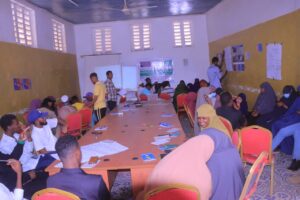
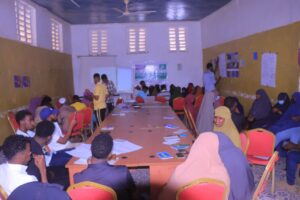
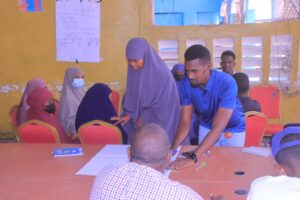
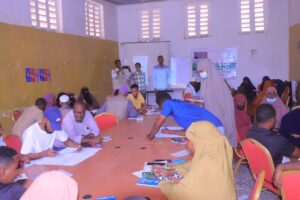
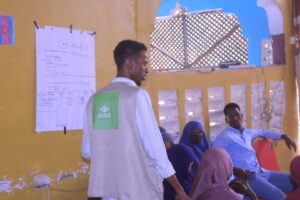
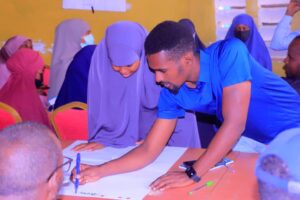
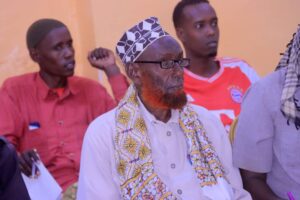
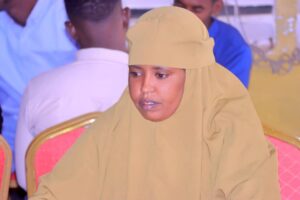
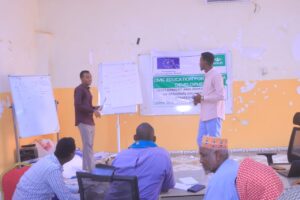
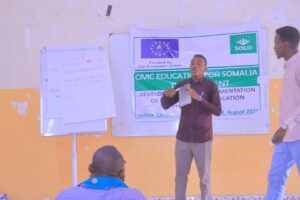
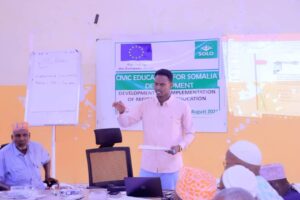
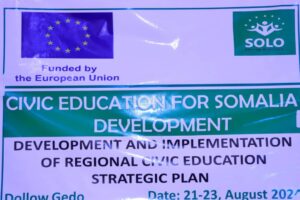
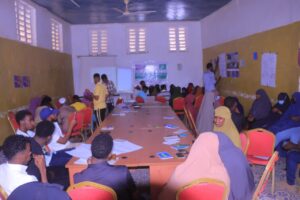
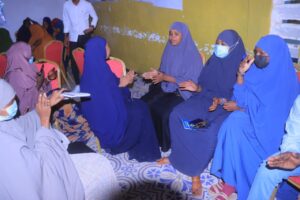
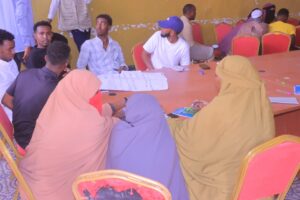
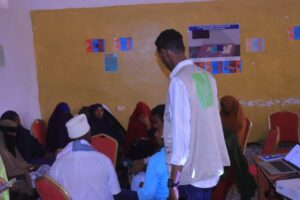
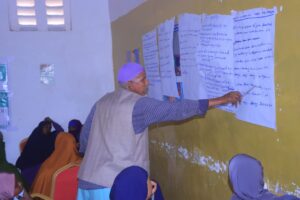
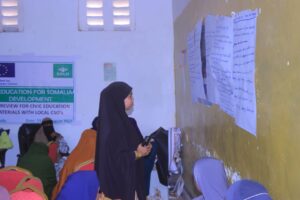
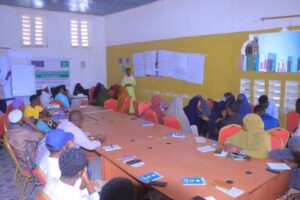
Dollow Sites
Dollow Sites | Name of theActivity | ActivityDescription | Results (outputs) | Reach (disaggregate by sex and age) | Challenges | Lesson learned | Any reconsideration/ adjustment |
| Dollow, Kabasa | Training men | The activity was done through Permission, Mobilization, Discussion and training. Training on importance of human rights, civic education was conducted. | The audience clearly understood the purpose of civic education and the importance of respecting human rights | Targeted Men in the communities | Some participants might have deeply ingrained cultural norms and stereotypes that resist the adoption of gender perspectives. Engagement sustainment is difficult due to lack of commitment. | Interactive and inclusive training methods effectively engage participants, highlighting gender perspectives and discussing societal norms, stereotypes, and power imbalances, thereby promoting fundamental rights and gender equality. | Regular follow-up sessions reinforce concepts, support daily application, and expand training to include diverse community groups, ensuring women understand and support gender perspectives. |
| Training Women | The activity was done through Permission, Mobilization, Discussion and training. Training on importance of human rights, civic education was conducted. | The training sessions were well-received, focusing on gender perspectives and the impact of societal norms, stereotypes, and power imbalances on women’s rights. Training women for interpretation of fundamental rights | Targeted Women in the society | Some participants might have deeply ingrained cultural norms and stereotypes that resist the adoption of gender perspectives. Engagement sustainment is difficult due to lack of commitment. | Interactive and inclusive training methods effectively engage participants, highlighting gender perspectives and discussing societal norms, stereotypes, and power imbalances, thereby promoting fundamental rights and gender equality. | Regular follow-up sessions reinforce concepts, support daily application, and expand training to include diverse community groups, ensuring men understand and support gender perspectives. | |
| Training Youth | The activity was done through Permission, Mobilization, Discussion and training. Training on importance of human rights, civic education was conducted. | Youth were made aware of contemporary issues related to interpretation of fundamental rights, such as freedom of expression. Youth were trained and provided with resources and guidance on how the can act to promote and protect interpretation of fundamental rights in their daily lives. | Targeted Youth in the society. | Engagement sustainment is difficult due to lack of commitment. | Regular follow-up sessions reinforce concepts, support daily application, and expand training to include diverse community groups, ensuring youth understand and support gender perspectives. | ||
| Kabasa | Training of Police Officers | The activity started with Seeking consent of the participants, Mobilizing them and inviting them to the venue for the training.The police officers were trained on Human Rights and duties of the citizens. | The participants comprehended the subject well and answered well the questions asked. The police requested for more similar trainings. | Police force | The operational duties of police officers posed full participation limitations in the training. Some police officers may have entrenched views that resisted new perspectives on human rights and citizen duties. | Police officers are highly engaged in ongoing education on human rights and citizen duties, highlighting the importance of ongoing education in fostering better understanding. | Implement regular and ongoing training sessions to reinforce the concepts of human rights and citizen duties among police officers. Establish mechanisms to monitor and evaluate the impact of the training on police practices and attitudes toward human rights. |
| Qansaxley | Mobilization and Training | The team went to the community to address the need to for civil education training. Content discussed was Democratic self-government and civic education | Youth were more interested in building community and Learning. The men in the community did not welcome the idea | Community leaders, households and youth | Men in the community did not welcome the idea may be due to cultural belie Gaining the trust of community members was challenging. | Trust building in a community involves consistent effort, genuine engagement, adaptability, and responsiveness to community needs, which helps fine-tune the training approach for improved outcomes. | Plan and conduct training sessions with the participation of religious leaders, and community leaders in order to increase acceptance and credibility. Create training materials that are specific to the cultural context of the community, highlighting important ideas with examples from the area and success stories. |
| Human Rights and Social Justice | In order to successfully navigate media landscapes, training sessions with a focus on media literacy and human rights awareness were held. A different session addressed social justice concerns, such as diversity, equality, and global citizenship, and it promoted participation in addressing global issues including poverty and climate change | The audience appreciated the activity, they were asking different question, they were also rising suggestions on the topic | Targeted civil society, community members, and the public | Some participants were skeptical about the importance of human rights and social justice, especially if these concepts conflict with existing beliefs or practices. Sensitivity to cultural issues. | Clear and culturally sensitive communication is essential for discussing complex and potentially sensitive topics like human rights and social justice.: Tailoring the training content to the specific cultural and social context of the participants enhances understanding and relevance. | Provide follow-up sessions or materials to reinforce the training and support continued learning and engagement. Consider extending similar activities to other communities and demographics to broaden the impact of the training | |
| Public Service and Leadership | The activity focused on educating participants about the importance of public service, ethical leadership, and civic engagement. It aimed to empower individuals with the knowledge and skills needed to actively participate in community projects and advocate for positive societal change. | The topic was challenging and the audience appreciated the activity as they learnt new perspectives how to foster good leadership | Targeted civil society, community members, and the public | Ethical leadership and civic responsibilities require sensitivity and adaptability in communication strategies, while limited resources like time, funding, and venue availability pose logistical challenges in organizing effective training sessions. | Stressing civic engagement promoted involvement in neighbourhood initiatives and grassroots campaigns, showing how people can start good changes in their areas. | Customize educational materials to suit diverse community backgrounds and learning styles for maximum engagement. Establish follow-up sessions to maintain momentum and encourage civic participation beyond initial training sessions. |
During the activities, the following major areas were emphasized among many others:
- Government, rule of law and constitution
- Drug and alcohol abuse
- Human rights and children protection
- Youth empowerment
- Participation in democratic processes
- Public service and leadership skills
- Human trafficking
- Good governance.
Summary
Activities on training areas
- Training on importance of human rights, civic education
- Police officers were trained on Human Rights and duties of the citizens
- Democratic self-government and civic education
- Session addressed social justice concerns, such as diversity, equality, and global citizenship, and it promoted participation in addressing global issues including poverty and climate change
- Educating participants about the importance of public service, ethical leadership, and civic engagement
Reach
The was a good number of turn out during each event:
- A team of around 400 youths attended the activities
- A team of around 600 females participated in the activities
- A team of about 450 males were involved in the activities.
Learnings
Generally, this shows that a lot of individuals are willing to learn new approaches and acquire new understandings to catalyse growth of the community and the country. More females attending than males indicate the society is changing and equity and equality is beginning to be felt. It is also evident the youth are actively involved in community change.
Kismayo Sites
Kismayo Sites | Name of theActivity | ActivityDescription | Results (outputs) | Reach (disaggregate by sex and age) | Challenges | Lesson learned | Any reconsideration/ adjustment |
| Calanley | Conflictresolution | The purpose of the activity was to equip the participants about conflicts resolution skills in order to address and mitigate local disputes, promote peace and strengthen community cohesion, topics discussed included negation skills and mediation cultural sensitivity in conflict resolution and building peaceful communities | Enhanced conflicts resolution skills among all the participants Increased awareness and understanding of local conflicts dynamics Empowered local leaders to take responsibility in conflicts mitigation. | The target people were male and female aged between 22 and 55 | Cultural barriers among the participant’s diverse traditional practice Resource limitations logistical facilitations can constrain the scale of conflict resolution Resistance to change and adaptation of new conflicts resolution methods | Local partnership and collaboration with local organizations and leaders were good. Understanding and respecting local traditions enhanced effective of conflict resolution techniques. Participants learnt the art of co-existing peacefully, considering views of every individual when solving issues and spreading love. | Follow up sessions Engagements and more actively involvements traditional and religious leaders who can have significant influence in the society |
| Participation in Democratic processes. | The activity equipped participants with knowledge, facts and importance of exercising their democratic rights. This activity as well involved learning about the importance of public participation and preservation of justice in the society through various ways. | Participants learnt about the importance of respecting each other human rights and that is the cornerstone to prosperity. Participants also learnt why they should get involved in voting during elections since there is where they have the opportunity to choose right representatives who will steer them to growth | The activity majorly targeted individuals between the age of 18 to 45. Both genders were involving but the larger share was females since the activity aimed inclusion and females have been left out in those processes for the longest time in history. | Resources are limited hence difficult to disseminate information to large groups. Cultural barriers and male chauvinism made the process a bit difficult since there is a belief that females should only be home wives. Education has not been embraced hence it proved difficult and time consuming to educate the participants. | Participants leant the importing of participating in democratic process through voting to elect leaders, being involved in public participation when discussing issues concerning them in the society and country at large. The target audience learnt about their basic human rights and were ready to help the society in learning what they knew. | Follow up sessions should be considered. The activity should target more groups and the larger population. Learning and religious institution should take time to teach the community the importance of participating in democratic processes. | |
| Drug Abuse | Discussed factors influencing drug and alcohol abuse e.g., peer pressure, low self-esteem. | Participants enjoyed the activity and asked for follow-up sessions. | Youth, and community leaders. 20 females attended | Discussing drug and alcohol abuse can be difficult due to its sensitive nature and potential personal impact on participants. | Expert input and real-life experiences enhance discussion impact and credibility. Follow-up resources and support are crucial for addressing participants’ needs and enhancing activity outcomes. | Create a safe and non-judgmental space for discussion, encouraging openness and respect. Invite experts to provide insights and facilitate the discussion, making it more relatable and informative. | |
| Youth Empowerment | The following major issues were discussed; The role of education in empowering women and girls. The impact of economic empowerment on communities and individuals. The importance of political empowerment in promoting social change among many others | The audience appreciated the activity, they were asking different questions concerning the topic on how they can drive change, and measures the government and well-wishers will put in place to empower them. They were also raising suggestions on the topic giving views of what they expect from leaders | The youth in the community and community leaders. 10 individuals (7 women and 3 men) participated in the activity. | Lack of civic education. Limited resource and unemployment. Lack of commitment from community member and leaders | Listening to the youth’s perspectives provides valuable insights into their needs, challenges, and aspirations. Strong community support is essential for the success of youth empowerment initiatives. | Encourage youth to participate in volunteer activities that develop their skills and sense of community responsibility. Identify and address barriers to youth empowerment, such as lack of access to education, employment opportunities, and social services. | |
| Dalhiska | Care for children and their rights, Awareness creation on IEDs against the children | A team of civic educators visited the center to educate families and other stakeholders on the importance of understanding and upholding children’s rights. The session aimed to raise awareness about the effects of children’s rights and to ensure that participants are conversant with the theme of the discussions. Created awareness on the risk connected with the IEDs substances for the children not to fall at risk | Participants were made aware of the importance of understanding and upholding children’s rights. After the session, attendees became conversant with the theme and subject of children’s rights. Participants leant children should not be subjected to child labor, and that they must be protected at all cost. Aspect of good governance was lightly touched on since it plays a great role in children rights and protection. The participants agreed to continue addressing the risks with IEDS | The target audience was families, both male and females of different ages. | Participants asked about food reliefs signifying they were starved. Cultural and education barriers somehow mad it difficult to disseminate information | After learning about children’s rights, participants demonstrated a significant understanding and appreciation for the topic, demonstrating that awareness sessions are helpful in increasing knowledge and appreciation of key social concerns. | Addressing specific challenges faced during the sessions and documenting them could help improve the effectiveness of future activities. Continued follow-up sessions could reinforce the knowledge gained and ensure long-term commitment to upholding children’s rights |
| Civic Education | The goals of civic education initiatives have been to advance women’s rights, family sanitation, income management, fairness and equality, healthy neighbourhood relations, communication between communities, and voting. Participants have generally shown knowledge and respect for the themes covered in the sessions, which have been well-received. | Participants generally showed a good understanding of these concepts, with sessions being participatory and well-received. Attendees demonstrated eagerness to apply the learned knowledge, appreciating the importance of these social issues in their communities. | The target audience was families, both male and females of different ages. | Participants frequently inquire about relief supplies and support from our programs, and express a need for water during hot weather sessions with trainers. | Better comprehension and memory of the material are achieved through interactive sessions where participants are free to freely discuss and share their opinions. The community responds favourably to topics that are current and urgent societal issues like women’s rights, equality, and justice, which emphasizes how crucial it is to select subjects that have an immediate influence on the participants’ life. | Continuous support and follow-up are essential to ensure that the knowledge gained is applied effectively. Trainers should understand and respect the cultural context of the participants enhances the effectiveness of the activity, ensuring that the information is relevant and easily applicable to their everyday lives. | |
| WDC | CIVIC EDUCATION | The civic education program conducted by SOLO Organization aimed to educate participants in a village setting about civic education and its significance. The sessions began with discussions on civic education, emphasizing citizens’ rights such as freedom, education, and travel. | Participants developed a comprehensive understanding of civic education and its role in society, particularly regarding citizens’ rights. Engagement and participation in discussions indicated effective communication and knowledge dissemination. | Target was general population, where both females and men were educated to ensure equity and unbiases. | Lack of commitment by the village leaders. Lack of consistent attendance and participation throughout the program | Effective introduction and contextualization of civic education topics at the beginning of sessions enhance participant engagement and understanding. Clear explanations of citizens’ rights resonated well with participants, highlighting the importance of tailored educational approaches in community settings. | Incorporate interactive activities or case studies to reinforce learning and application of civic education principles Evaluate participant feedback to continuously adapt and improve future civic education programs, ensuring they meet the specific needs and interests of the community. |
| Government, Constitution, and Human Rights | SOLO Organization conducted a civic education session focusing on government, constitution, and human rights in a village setting. Discussions began with participants sharing their perceptions and understanding of human rights, followed by an exploration of the role of government in communities. Participants engaged in discussing the government’s role as a pillar of community stability, highlighting its importance for peaceful coexistence. | The community members now have a better understanding of the rule of law, the operation of the legal system, the value of equal treatment under the law, and the accessibility of justice. The community members have now understood what human rights are and how they can handle issues about the human rights | Target was general population, where both females and men were educated to ensure equity and unbiases. | Lack of commitment by the village leaders. Lack of participant because of the heavy rains. Delay of summited report due to the heavy rains | Acknowledging community members’ perceptions of government as essential for community stability helps tailor civic education programs effectively. Providing clear explanations about the role of law, the judicial system, and access to justice ensures that participants grasp fundamental civic principles comprehensively | Foster ongoing discussions on government and human rights to sustain community engagement and reinforce learning over time. Utilize visual aids or multimedia presentations to supplement verbal explanations, catering to diverse learning preferences and enhancing retention of key concepts. | |
| Midnimo | Visitation of Midnimo village and engaging with youths, people in IDPs and returnee homes | A team of civic educators visited Midnimo village to engage with different community groups about their civic rights and responsibilities. They spoke with IDPs, returnees, and youth girls, addressing the importance of political participation and understanding of civic duties. The visits revealed that many IDPs were unaware of their rights and uncomfortable with political involvement, while some returnees feared retaliation for voicing concerns against the government. | IDPs in Midnimo village are unaware of their civic rights and responsibilities, and some feel uncomfortable participating in politics due to fear of retaliation. Girls in Midnimo village understood their rights and responsibilities effectively. | Targeted population of both genders aged between 18 to 45 | Feared retaliation for speaking against the government. Low levels of awareness and apprehension towards political participation | Significant gaps exist in awareness among IDPs and returnees. There is need for focused, repeated educational efforts. Younger populations, especially girls, show understanding and readiness to learn about their rights | Develop trust-building initiatives and ensure anonymity for participants to alleviate retaliation fears. Utilize culturally relevant communication strategies and local languages for enhanced understanding and engagement. |
| Modeling good citizenship in the village | Educating the villagers about tax payment, why pay and how government manages the tax they pay. In addition to teaching about the value of abiding by the law, they were the value of treating oneself fairly and impartially. | They understood that by modeling good citizenship in Midnimo village their community can help to create more informed, engage and responsible citizenry | Both female and males of age 18-45 | some community members have low literacy levels, challenging for them to fully grasp the concepts being taught. | There is need for thorough civic education and engagement. | Engage in activities that build trust between the community and the government, such as transparent discussions on how tax funds are utilized and managed. | |
| Civic Engagement | A team of civic educators visited Midnimo village to promote civic engagement and awareness among residents. They educated the community about their rights and responsibilities as citizens, the principles of democracy, and the Somalia constitution. The residents were eager to learn, appreciated the educators’ efforts, and showed a clear understanding of how these civic concepts can be used to promote peace, justice, and development in their community. | The community members were very receptive to our messages. They expressed their commitment to working together to build better future for their future generation in understanding of civic educations. | Both female and males of age 18-45 | Lack of access to community center in Midnimo village. Historical trauma and distrust to the authority, the legacy of conflict and violence in Somalia has left many residents with a deep-seated mistrust of authority figures and institution. Heavy rains that limits access to the center | Residents’ enthusiastic interest in civic education and appreciation for educators’ efforts suggest a strong community interest in continuous efforts to deepen understanding of civic rights, democracy, and the constitution. | Regular follow-up sessions and community engagement with local leaders and influential members are essential for reinforcing teaching concepts and fostering credibility and community buy-in. | |
| Shaqaala | Community Engagement | Activities focused on promoting civic engagement, understanding democratic processes, and building coalitions | Increased awareness of democratic processes, understanding social issues, and a sense of responsibility towards civil society | Targeted youth, community leaders, and community members | Challenges in promoting diversity in civic engagement, specifically in creating inclusive and representative spaces for all individuals | Increased awareness of democratic processes, understanding social issues, and a sense of responsibility towards civil society | Implement targeted outreach strategies to engage marginalized communities and ensure their representation in civic engagement activities |
| Inclusion and Diversity | Workshops and discussions focused on the importance of inclusion in civic engagement | Developed practical skills and knowledge to promote diversity in their communities and work towards creating more inclusive and representative spaces for all individuals. | Targeted community members, local leaders, and youth | Barriers to promoting diversity in civic engagement, particularly in addressing different dimensions of diversity and inclusion | Increased awareness of understanding the importance inclusion in civic engagement. Practical skills and knowledge gained to promote diversity in communities | Develop tailored training programs to equip individuals with the skills needed to address different dimensions of diversity and promote inclusivity effectively | |
| Constitution and rule of law | Activities aimed at promoting awareness and understanding of the Constitution and its role in shaping the democratic system | Increased understanding of the rule of law, advocacy for the Constitution, and active participation in the democratic process | Targeted civil society, community members, and the public | Encouraging active participation in the democratic process, especially in advocating for the Constitution and the rule of law | Participants in these activities gained a deeper understanding of the importance of law and order in society. Through these activities, individuals became more aware of their constitutional rights and were empowered to take an active role in building a strong and democratic society | Organize interactive workshops and discussions to encourage active participation in advocating for the Constitution and the rule of law, fostering a culture of civic responsibility |
During the activities, the following major areas were emphasized among many others:
- Government, rule of law and constitution
- Conflict resolution and coexistence
- Traffic regulations
- Drug and alcohol abuse
- Human rights and children protection, responsibilities
- Good governance and Social justice
- Youth empowerment
- Participation in democratic processes
- Public service and leadership skills
- Human trafficking
- Good governance.
The was a good number of turn out during each event:
- A team of around 1200 females participated in the activities
- A team of about 1300 males were involved in the activities.
Generally, this shows that a lot of individuals are willing to learn new approaches and acquire new understandings to catalyst growth of the community and the country. More females attending than males indicate the society is changing and equity and equality is beginning to be felt. It is also evident the youth are actively involved in community change.
